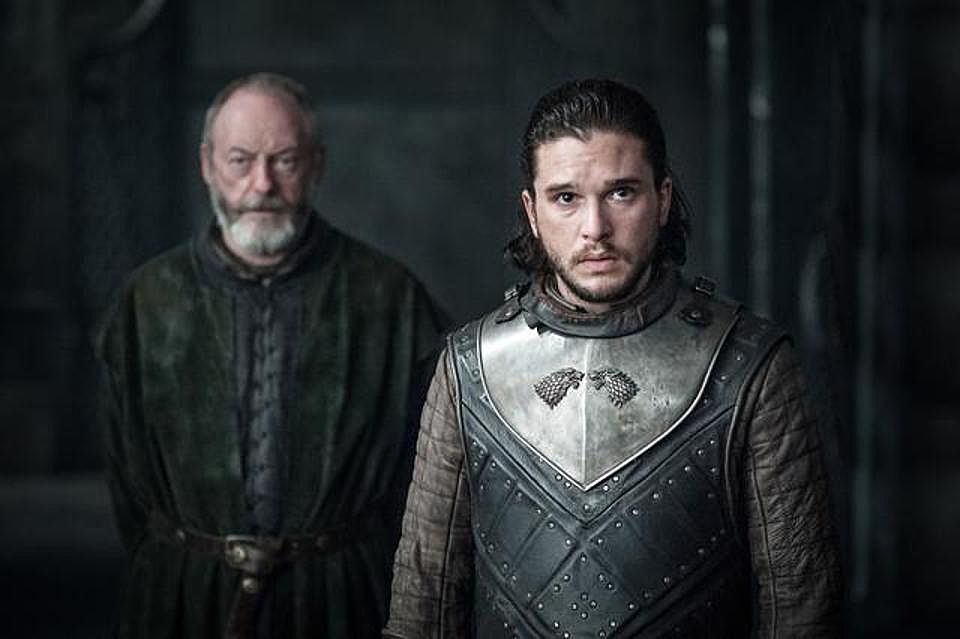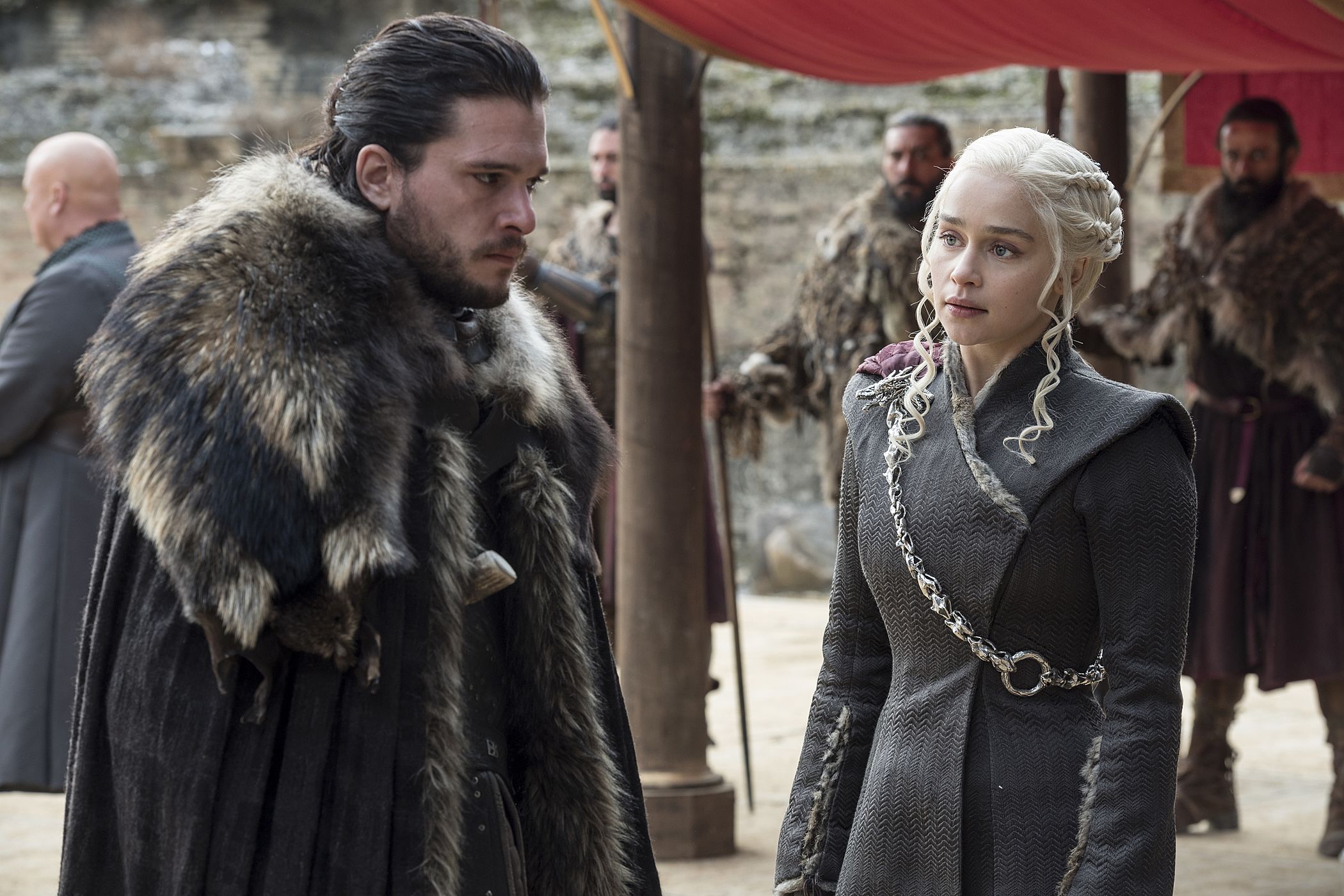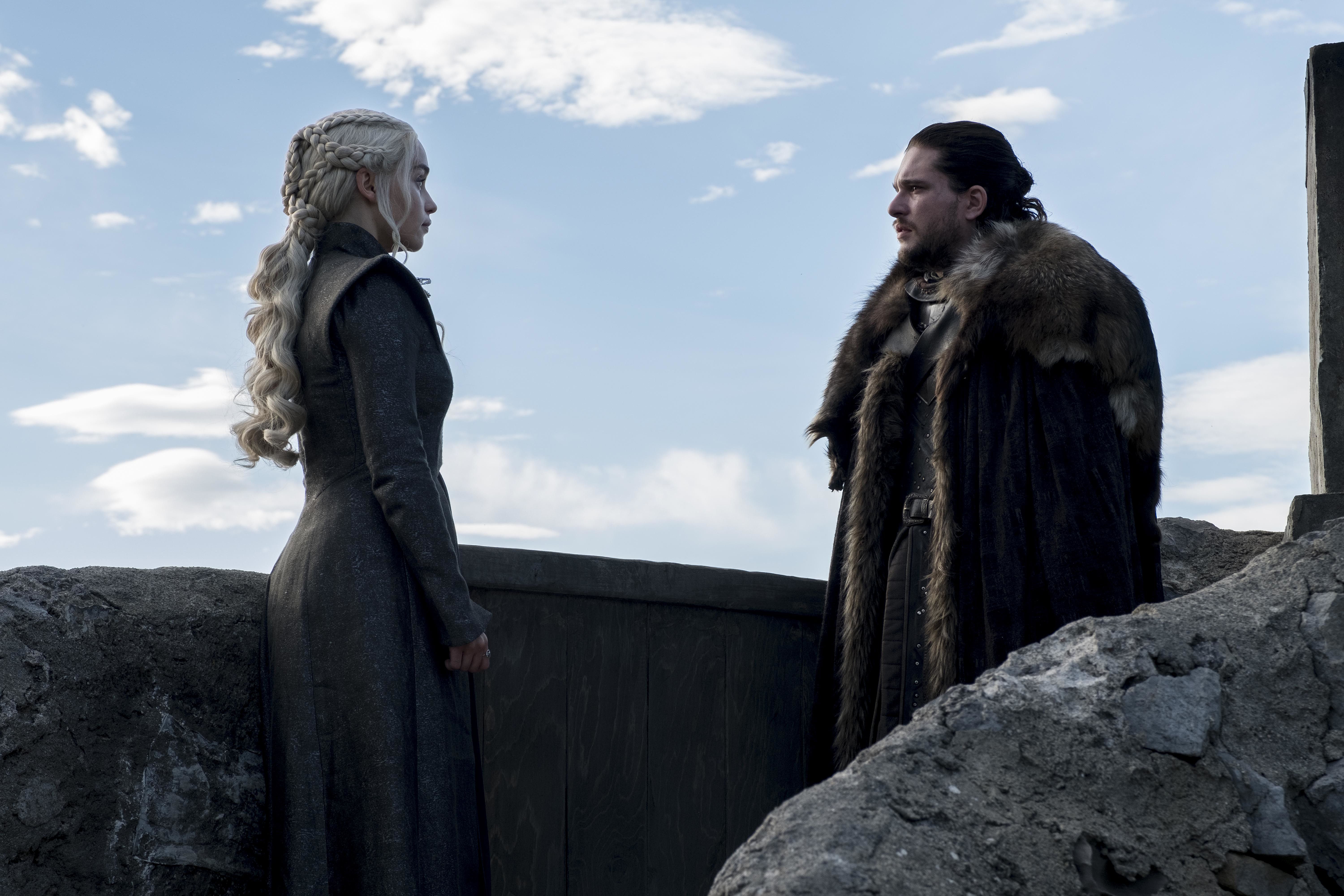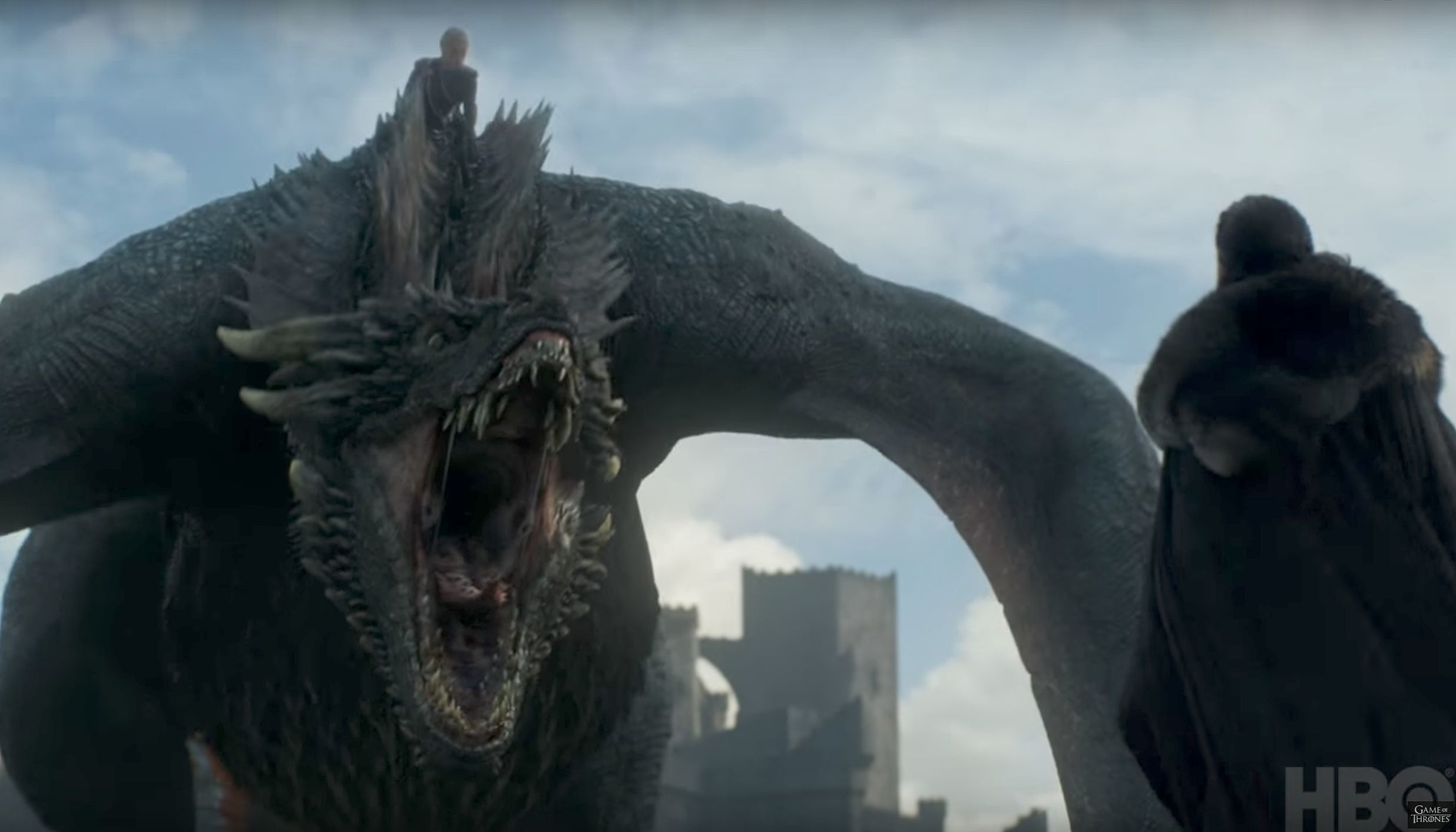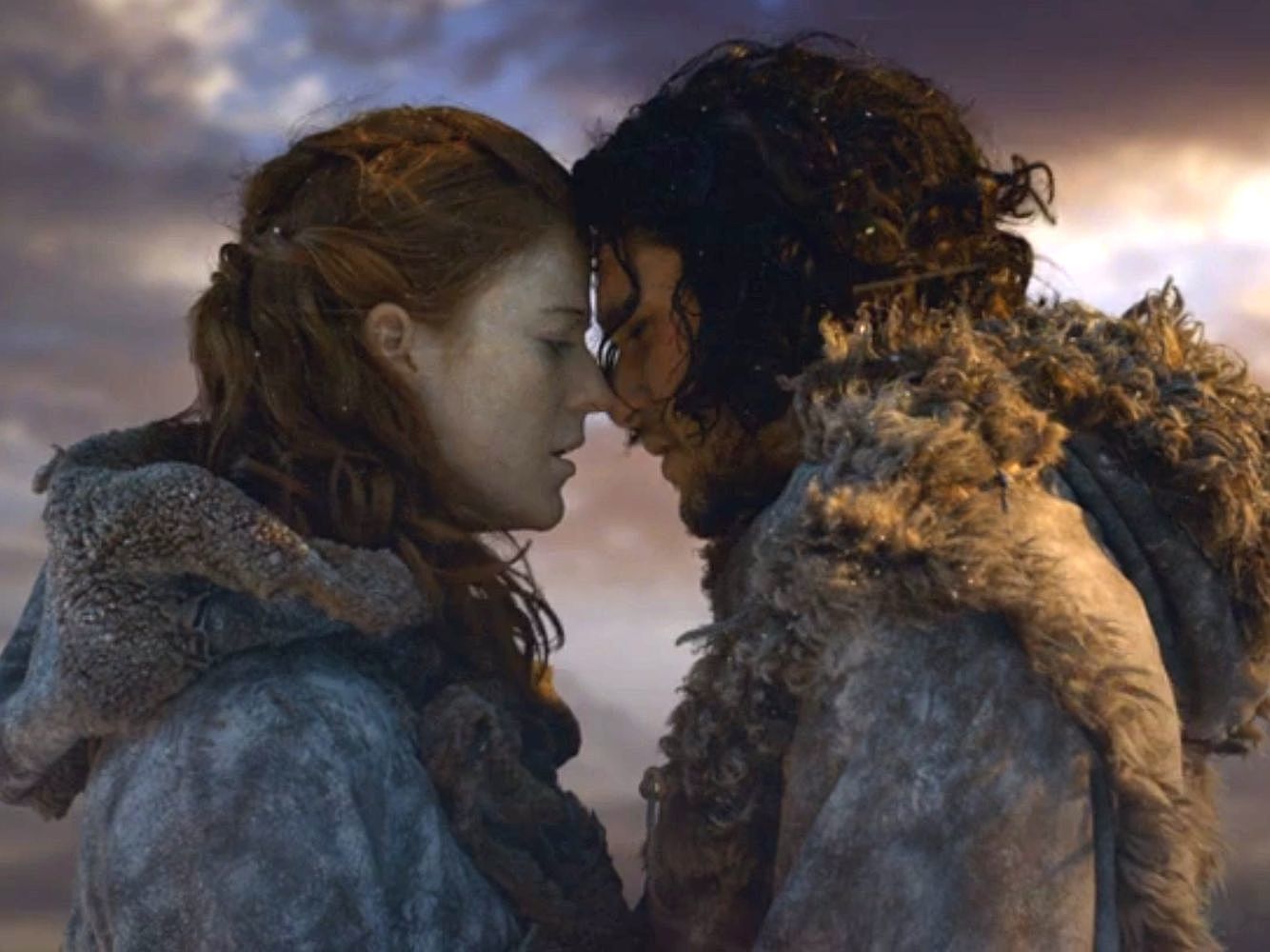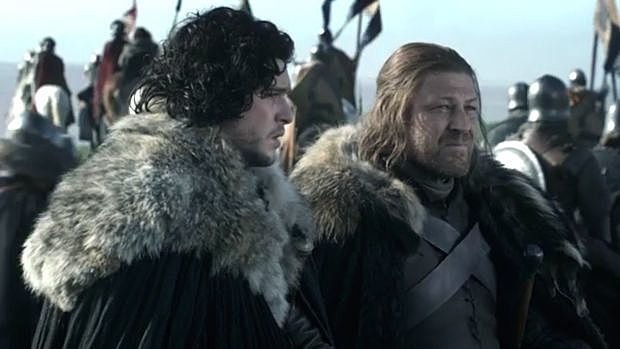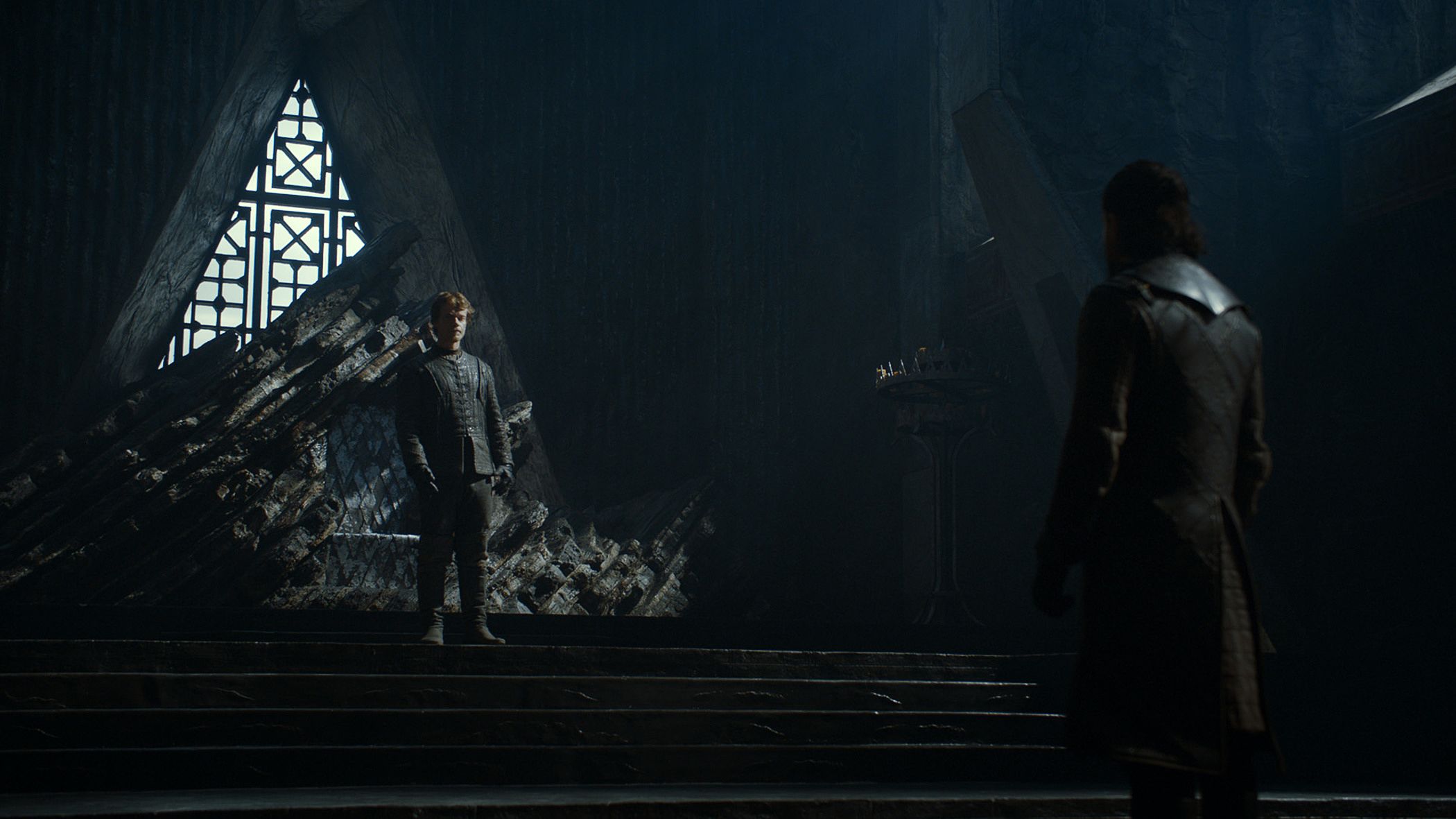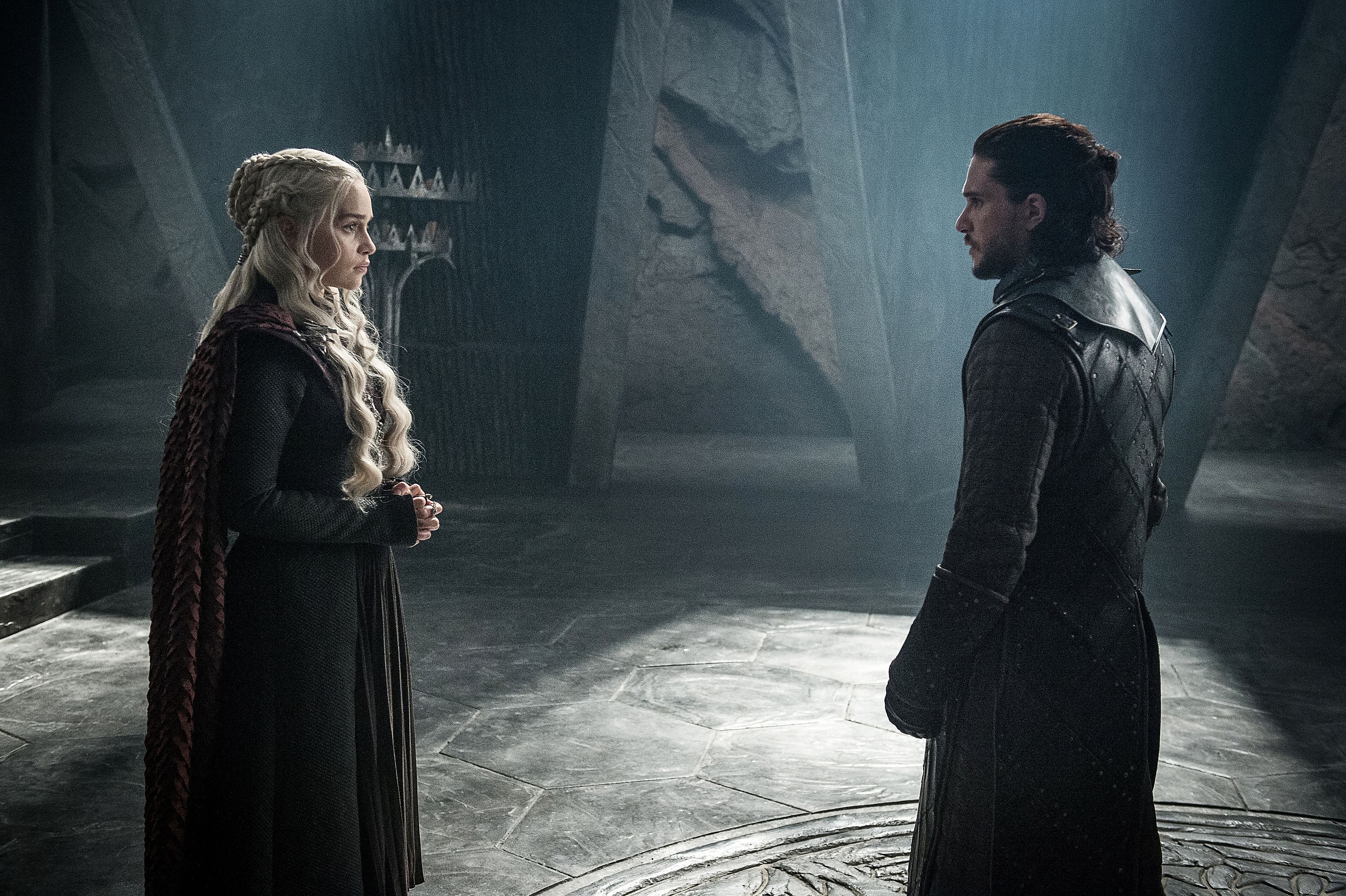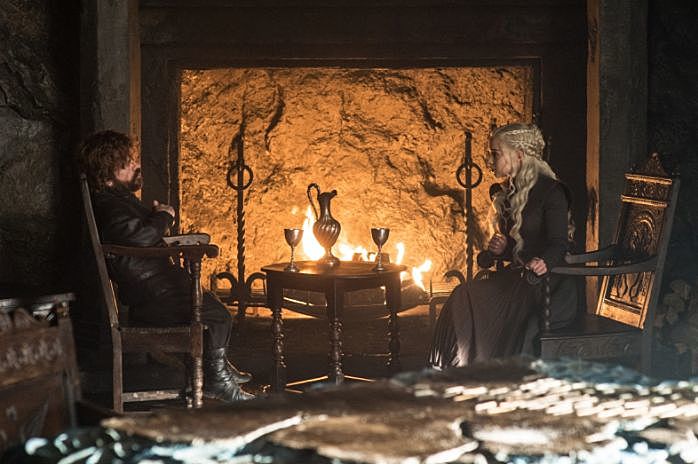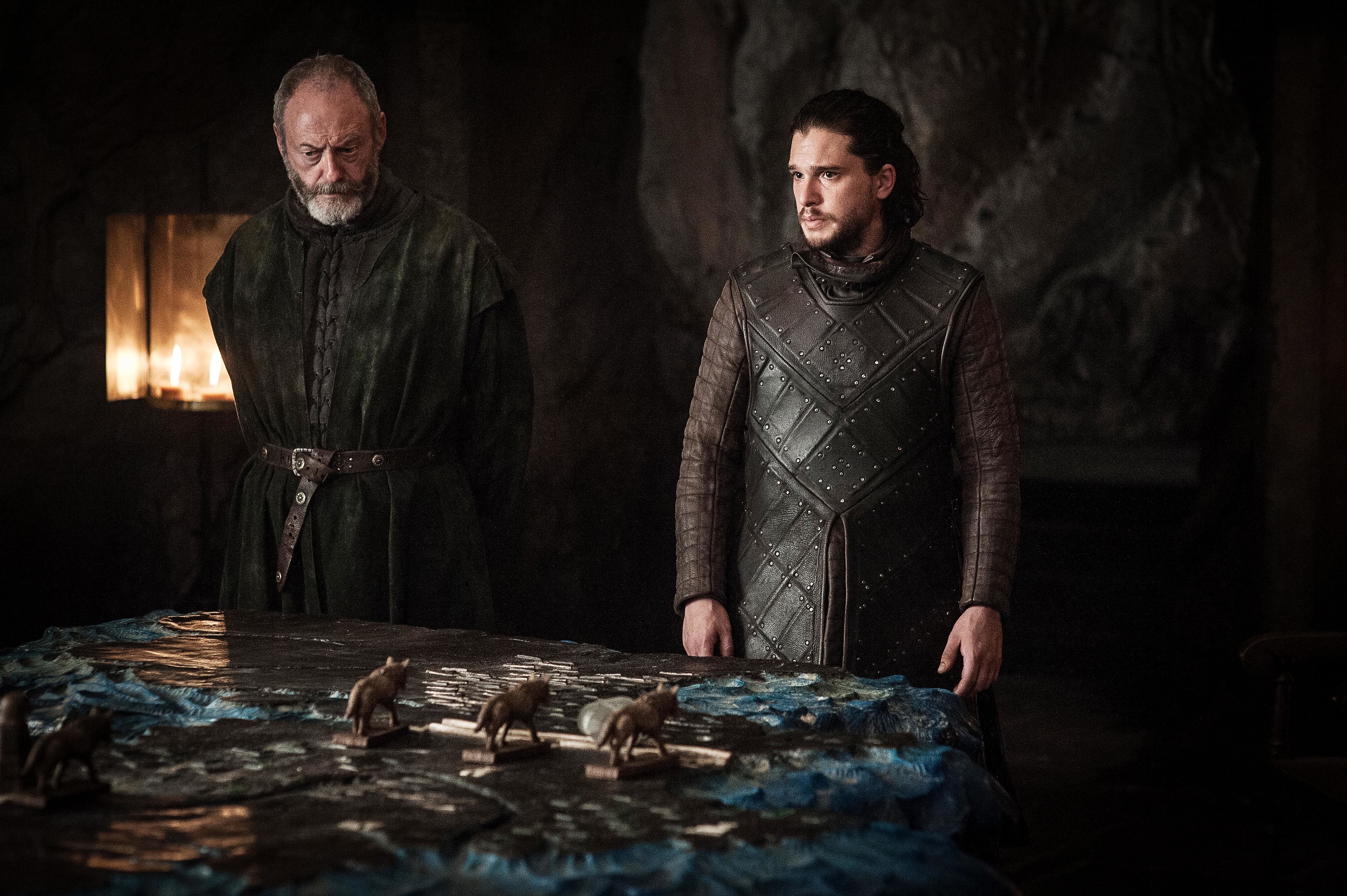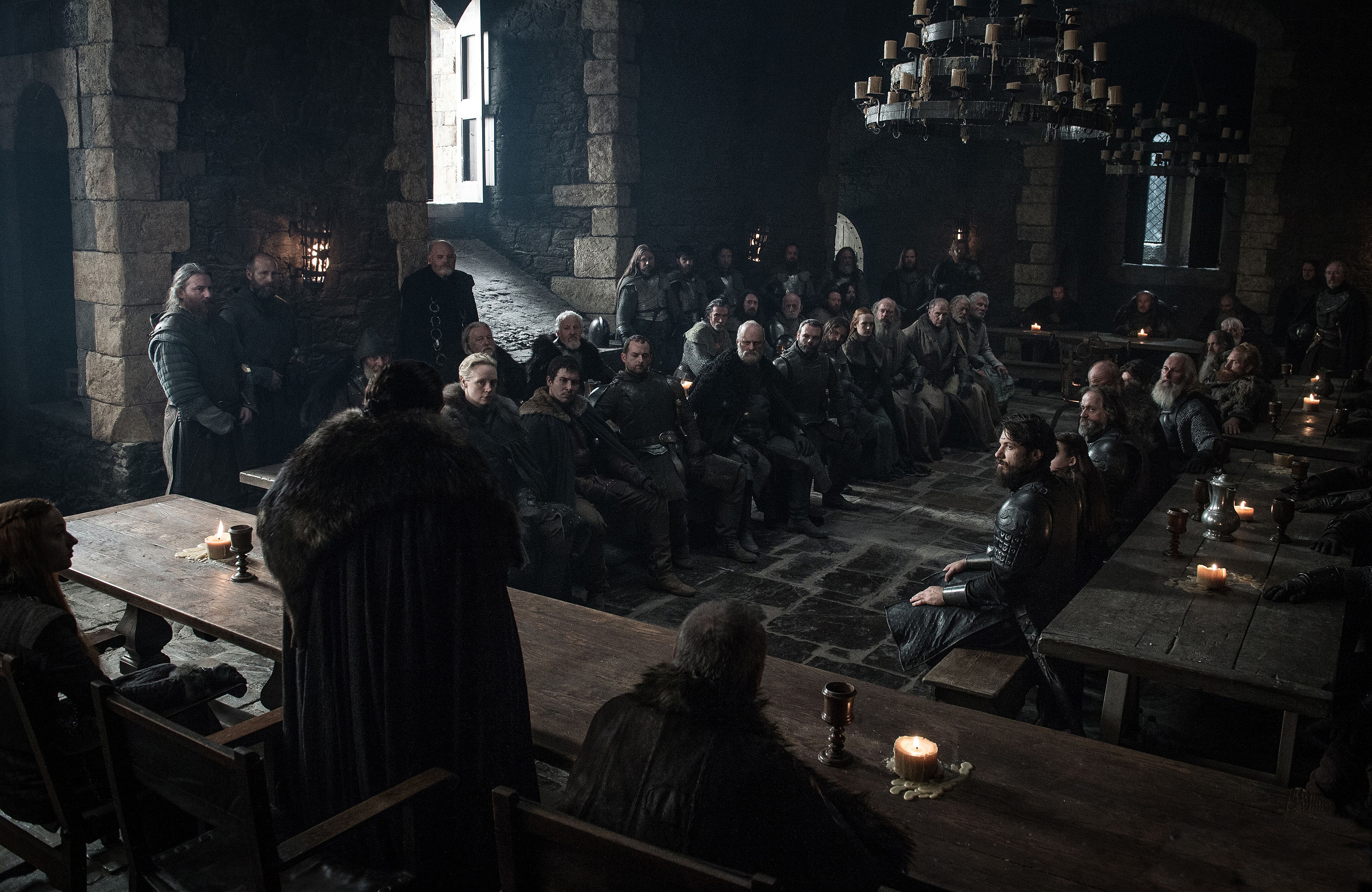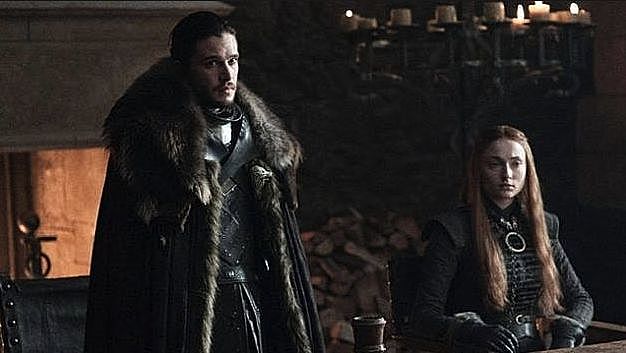The more people you love, the weaker you are. You’ll do things for them that you know you shouldn’t do. You’ll act the fool to make them happy, to keep them safe.
—Cersei Lannister; Game of Thrones, 2.7: A Man Without Honor
The end of Game of Thrones season 7 was neat and orderly. Although the largely uncontested villains of the series — the White Walkers and Cersei Lannister — remain on the warpath, the assumed heroes are on their way to Winterfell to fight against supernatural foes to save humanity from extinction. Toss in a little romance between Jon and Daenerys, and we’re halfway to a Disney movie, albeit a grim one.
On the surface, this tidy turn of events doesn’t have me excited. But upon further inspection — considering the nuances, dialogue, and elements of foreshadowing — I’m curious about what’s at play beneath the surface. What exactly was going through Jon Snow’s head this year?
“Here I am, a Northern fool,” Jon laments during his conversation with Tyrion on the bluffs of Dragonstone in “The Queen’s Justice.” Jon is self-aware — he’s made mistakes, and Tyrion advises him on how to proceed in spite of them. My reading is that, at this point, Jon’s ill-conceived trek to Dragonstone shifts from an attempt to form an alliance to a (largely internal) struggle to survive and escape.
Prior to his departure from Winterfell, Jon makes a speech to the Stark bannermen:
You all named me your king. I never wanted it. I never asked for it. But I accepted it, because the North is my home. It’s part of me, and I’ll never stop fighting for it, no matter the odds.
This is typical of Jon as we’ve come to know him — he is of the North, and it is first in his heart. But then, a handful of episodes later, the audience is meant to believe that Jon has gone back on these words because he fell in love with the woman who demanded fealty at every turn, and imprisoned him when he refused. Something is rotten in the state of Westeros.
Ultimately, my conclusion is this: Jon’s arc in season 7 isn’t about romance. Rather, it’s about him taking control of an uncontrollable situation, and bending Daenerys’ demands to achieve his ends.
The heart of the issue is the question of how far will Jon go to do right by his promise to protect the North. Time to take a deep dive into character analysis, plot speculation, and theorizing.
The issue of Jon’s consent
Jon arrives on Dragonstone with the express purpose of making a military alliance with Daenerys Targaryen, unaware of the stipulation that Daenerys expects him to bend the knee. When Jon learns of this stipulation, he’s ready to return to the North, insisting that there’s “no time” for any war aside from the one against the White Walkers. There is nothing for him on Dragonstone without Daenerys’ cooperation; he might as well return to the North empty-handed but overall no more or less prepared than he was prior to the journey.
But Daenerys has other ideas for the King in the North, the king who refuses to abdicate his rule.
JON: “Am I your prisoner?”
DAENERYS: “Not yet.”
Only he very much is. When Jon and his party arrive on Dragonstone, Daenerys’ followers confiscate their weapons. Daenerys keeps all of hers, including her dragons, and makes clear that she expects Jon to bend the knee to her, one way or another. He may not be confined to a cell, but Jon is being held against his will, with no means of fight or flight; that’s imprisonment. And Jon recognizes himself as a prisoner; his consent in the matter is nonexistent.
From the beginning, the power dynamic between Jon and Daenerys is lop-sided. Jon is either her prisoner or her subservient, and as such, he’s at her mercy. That can be a precarious position to be in, as we saw when Daenerys executed the Tarlys. Jon observes this much about Daenerys’ character when she rages at Tyrion on the beach in “The Spoils of War,” before she leaves for the Blackwater Rush.
So what’s Jon’s objective? To survive and escape by any means necessary, which proves difficult. Even after Jon leaves Dragonstone for Eastwatch, he later finds himself back where he started: under Daenerys’ thumb, on a Targaryen ship headed wherever she commands it to go. Once again, he has to spin his less-than-favorable circumstances to his advantage during their scene in the ship’s cabin.
Jon’s lack of free will is underlined by the original script for that scene. In an earlier draft, Daenerys undresses an unconscious Jon as he lays in bed and sees the scars left by his murder for the first time. In the final cut of that scene it is Davos, a man Jon knows and trusts, who undresses him, while Dany sees the scars as a passive viewer. Even though the final version of the scene made a different choice, the original version is telling, since it gives a look into how the producers originally conceived of the power dynamic between Jon and Daenerys, and could hint at how the audience is meant to perceive their relationship. Dany disrobing Jon is not romantic because Jon, being unconscious, has not consented to it, nor has he consented to the moments leading up to it.
True: in “Beyond the Wall,” Jon bids Gendry to send word to Daenerys before he and his companions get trapped on a frozen lake surrounded by wights, but that was about the fact that Daenerys had the means to rescue them, not Jon’s desire to become her prisoner all over again. Even when Dany arrives with the dragons in tow, Jon is prepared to stay behind in an (ill-fated) attempt to end the White Walker threat on his own — he is slow to mount Drogon when everyone else has already climbed aboard, and seems to be seriously considering making a run at the Night King and ending things once and for all.
Another scrapped bit of dialogue comes from an early outline of the script for “The Dragon and the Wolf,” the season 7 finale. (Like a lot of things in season 7, it leaked ahead of time.) In this draft, at the end of the meeting where Jon and Dany decide to sail to White Harbor together, Dany mentions that “[s]he has some things she’d like to discuss with Jon later, privately,” essentially summoning him to her chambers. This leads to the sex scene at the end of the episode. And who is Jon — who has pledged fealty to her as a queen, thereby making him her subject — to deny her such a request?
The outline also contains this direction: “Jon walks into Dany’s cabin below decks, knowing exactly what he wants and what she wants.”
This word choice suggests that what Jon wants and what Daenerys wants are two separate things. Were they on the same page, the outline probably would have been worded more deliberately, e.g. “Jon walks into Dany’s cabin below decks, knowing exactly what they both want,” or even, “[…] knowing exactly what he wants.” Instead, the phrasing suggests that Jon and Daenerys have two different goals, and that Jon is willing to exchange “what she wants” for “what he wants.”
Jon plays the game, but holds his cards close to the chest
Kit Harington talked about Jon Snow’s character development in season 7 to Smile Magazine (emphasis mine):
Jon is probably one of the more stable characters all the way through. You return to him each year and he doesn’t change a great deal. I have always quite liked that about him. But this year, he does change. He becomes a politician. Having gone to the brink and seen things that other people haven’t seen, he starts manipulating people — in a very Jon Snow way, in a very kind way. You see the greatest change in him. It’s a weird thing playing a character like that. You live with him for all these years, and as he changes, you change. He is not the kind of mopey teenager type anymore. He is a bit more of a man on a mission. So this is a good year to look out for him.
This very much jives with Maester Aemon’s words to Jon in the fifth episode of season 5: “Kill the boy, Jon Snow. Winter is almost upon us. Kill the boy, and let the man be born.”*
But the question is: Who is Jon manipulating, and why? With whom does he have to play the part of politician?
Jon Snow is fighting the White Walkers, but there’s no playing politician with them. Jon also has to deal with Cersei Lannister, but he doesn’t try and manipulate her during the summit at the Dragonpit. Rather, he’s completely honest about pledging himself to Daenerys when manipulating and lying might have served him better, as Tyrion points out. The only other candidate is Daenerys herself.
Jon is playing the political game. He is not, as Sansa warned against, acting rashly as Ned and Robb did; he is more aware of the dangers of his position, and he responds accordingly.
In season 1, Ned laid all his cards on the table for Cersei, telling her that he knew of her children’s true parentage and planned to reveal all to Robert. That might have been the honorable choice, but it led directly to the downfall of his family. In season 7, Jon gives nothing away to Daenerys — instead, he molds himself to her demands and preferences so that he might earn his freedom. Jon doesn’t put his family’s safety on the line.
Jon does not allow Daenerys to get to know him intimately, ensuring she has nothing to use against him should their alliance sour. This could account for Jon’s muted reaction when he learns that Bran and Arya are alive and at Winterfell. That’s also why Jon never willingly tells Daenerys about his murder at the hands of the Night’s Watch, even stopping Davos when he’s about to say too much in “The Queen’s Justice.” The less Daenerys knows, the better. Jon does, however, freely discusses the matter of his resurrection with Beric Dondarrion (albeit only after Tormund told Beric of it offscreen), so it’s not as though he’s completely opposed to such conversation.
In fact, even as late as the fifth episode of the season — “Eastwatch” — Jon downplays any connection he has to the Dragon Queen (emphasis mine):
I came here, knowing you could have your men behead me or your dragons burn me alive. I put my trust in you, a stranger, because I knew it was the best chance for my people, for all our people. Now I’m asking you to trust in a stranger, because it’s our best chance.
Jon still considers he and Daenerys to be strangers. With only two episodes of the season left to go, there’s still an emotional disconnect on Jon’s end. That doesn’t exactly spell “epic romance.”**
Kit Harington does not play Jon Snow like a man in love, but a man willing to do what he must to schieve his goals. He is constantly placating Daenerys, telling her what she wants to hear or at least sugarcoating his observations to avoid any backlash. See especially: Jon’s initial reaction to Daenerys when she comments on how “beautiful” her dragons are in “Eastwatch.”
Daenerys: “They’re beautiful, aren’t they?”
Jon: “Not the word I was thinking of, but…” [off Daenerys’ look] “…but yes, they are. Gorgeous beasts.”
Jon swaps out his light incredulity for acquiescence once he realizes that Daenerys does not take kindly to criticism of her “children.” This is also apparent when Jon advises her against burning the Red Keep in response to Cersei’s victory at Highgarden in “The Spoils of War.” And while Daenerys takes his advice, she goes on to destroy the food Jaime and his army had brought back from the Reach, food meant for the common people in King’s Landing she claims to represent. Daenerys doesn’t burn the people in their homes, but she still dooms them to starvation in the midst of war.
At the Dragonpit, Jon does the same thing: Daenerys talks about how the Targaryens are nothing without their dragons, and Jon assures her that she’s still something special. Because Jon Snow knows two things: One, dragonglass/fire kills wights and White Walkers; and two, through his interactions with Daenerys, as well as his conversation with Missandei on Dragonstone, Daenerys is taken with her own “liberating queen” persona. He needs Daenerys to trust him, because the Northerners are likely to reject her.
Considering that, it’s strange that almost no one has suggested the possibility of a marriage alliance between Jon and Dany. That could promote goodwill, reconcile the bad blood between Houses Targaryen and Stark, and ensure that the White Walkers would face a united front when the time comes. It’s the kind of solution that Tyrion, Varys or Davos might propose, but the only person to bring it up is Littlefinger, of all people, when he’s talking to Sansa in the season 7 finale.
Why isn’t this angle given more consideration? Put simply, it’s because the purported “romance” between these two isn’t what it might seem at first blush.
The red herring romance
Throughout Game of Thrones, the showrunners have demonstrated an especial aptitude for writing a variety of romances, from unrequited to forbidden, tragic to healthy, dysfunctional to stable, including Ned/Cat, Robb/Talisa, Jon/Ygritte, Jaime/Cersei, Jaime/Brienne, Jorah/Daenerys, Drogo/Daenerys, Sam/Gilly, and Missandei/Grey Worm, to name some of the most notable pairings.
Keeping this in mind, why is Jon and Daenerys’ relationship so lacking? Alan Sepinwall of Uproxx observed that the chemistry between the two in “Beyond the Wall” seemed off “despite [Emilia Clarke’s] best efforts,” but what if the “something off” comes down to the attraction between them being one-sided, with Daenerys having fallen for Jon but the not the other way around? Harington may be performing as he’s meant to, showcasing that this romance is disingenuous on Jon’s part, feigned mainly to secure Dany’s cooperation — and her dragons and armies — in the upcoming fight against the White Walkers.
Whenever we get a scene that might be interpreted as romantic, like the one in the cave in “The Spoils of War,” it’s undercut by the overhanging issue: that Daenerys demands Jon bend the knee in exchange for her help, or by Jon’s attempts at mollifying her. We can see this at work after the wight hunt, when Jon wakes up on the ship and immediately apologizes to Daenerys for the loss of Viserion, despite the fact that Jon lost men on that mission, as well as his uncle Benjen.
One moment the showrunners could have used to convey mutual affection is when Jon leaves Dragonstone for Eastwatch, by means of the tried-and-true “looking back at someone longingly” trope. It’s been used to good effect on the show before, in farewell scenes between Ned and Catelyn, Jaime and Brienne, and Robb and Talisa. If Jon had spared Daenerys a glance over his shoulder as he pushes his boat into the water, then we might have had something. But instead that direction is given to Jorah — a man we know for a fact is in love with Daenerys — drawing a distinction between Jorah’s feeling for Daenerys and Jon’s feelings for her.
The shows eschews other romantic tropes, as well. For example, there’s no romantic tension between Jon and Jorah; instead, the two have a respectful conversation where Jon offers to give Jorah Longclaw, and Jorah insists he keep it. Contrast that with the rivalry between Jon Snow and Orell the wildling in season 3. Orell was clearly interested in Ygritte, and tried to undermine Jon’s relationship with her by telling Jon he’d “never hold onto her” and offering himself to Ygritte as an alternative. With Jon and Daenerys, we don’t have the “jealous lover” trope.
In general, the show gives us far more romantic cues about Jon and Ygritte than it does about Jon and Daenerys, from the way Jon smiles and jokes around Ygritte to the moment they share once they reach the top of the wall, complete with sweeping music and a scenic vista spread out in front of them as they share a passionate kiss. Meanwhile, the most intimate scene Jon and Dany share — their love scene on the boat — is more about the reveal of Jon’s parentage than it is about their relationship. And that reveal establishes Jon as a legitimate contender to the Iron Throne, which means he could be Daenerys’ enemy, rather than her lover, by the series’ conclusion.***
Season 7 only lasted seven episodes — the show didn’t have the time to develop a relationship between Jon and Daenerys that they did for a couple like Jon and Ygritte, but that’s no excuse for this “romance” being so lackluster. The showrunners know what they’re doing; if they wanted the time to develop a proper romance, then they would have asked for it. Grey Worm and Missandei only had one scene together this season — a love scene — and it was more intimate than anything Jon and Dany shared.
All things considered, a rivalry seems more likely than a romance. What’s the point of revealing Jon’s secret Targaryen parentage if it doesn’t provide conflict? If Jon and Daenerys were meant to fall in love and end the series as rulers of the Seven Kingdoms, then Jon actually being Ned Stark’s bastard would serve the story better; that would create a true alliance between North and South. But as the audience now knows, Jon is the heir to the Iron Throne, not the Kingship in the North. If this doesn’t cause enmity between Jon and Daenerys — the latter of whom believes she is the last of the dragons, and the rightful successor to the Iron Throne — then all the hype surrounding the secret of Jon’s origins is anticlimactic.
That’s unless you believe that a Targaryen restoration is upon us, in which case there’s nothing left to debate. But recall that the original title for the final book in the Song of Ice and Fire series was A Time for Wolves — something tells me that, when all is said and done, the wolves will be triumphant.
Where do Jon’s true loyalties lie?
Parellels are drawn between Jon and Ned throughout season 7. Ned’s a fine man to be compared to, but he wasn’t perfect. We must keep in mind Sansa’s warning to Jon in the season 7 premiere:
You have to be smarter than Father. You need to be smarter than Robb. I loved them, I miss them, but they made stupid mistakes and they both lost their heads for it.
Jon, as well as the audience, is thus reminded that, to win the game of thrones, a measure of ruthlessness is necessary. Sometimes, personal honor must be sacrificed for a greater purpose. Otherwise, Jon follows in the footsteps of his father uncle and brother cousin, likely into his own grave…again.
And even as honorable as Ned was, he was capable of deception in service of what he believed to be the greater good, most obviously when he raised Jon as his own son, never sharing the secret his sister begged him to protect, not even with his wife. Likewise, Jon deceived the wildlings when he infiltrated their ranks, and wasn’t above using Ygritte’s feelings for him to his advantage. It’s true that Jon fell in love with Ygritte, but not to the point where he abandoned his duty to the Night’s Watch; he was with her in part because he wanted to be, and in part because if he didn’t do something to convince the wildlings he was on their side, he would be killed.
In season 7, Jon’s duty is to the North, his family, and in the grand scheme of things, to humanity. If he wouldn’t desert the Night’s Watch for Ygritte — a romance that we saw progress — he wouldn’t desert the North for a romance with Daenerys that hasn’t been developed.
When Robb went back on a promise he’d made for the love of a woman from Essos, he lost valuable allies, and eventually his life. If Jon has truly bent the knee to Daenerys for any reason other than a last-ditch effort to survive, he’s repeating that mistake. More than that, if Jon ceded Northern independence, he would be betraying his family members who died defending it — Robb and Catelyn at the Red Wedding — and those who fought to take it back from the Boltons, namely Sansa, not to mention all the Northern bannermen who perished and suffered for it along the way.
Is it immoral for Jon to use Daenerys’ affections for him in this way? That comes down to personal opinion. On Game of Thrones, morality is more nuanced and realistically human than right-vs-wrong, or black-vs-white, or “love conquers all.” While romantic love is a part of the show, it has a terribly messy history — just ask Shae, Ygritte, Khal Drogo, Ned Stark, Catelyn Stark, and many others. More reliable is love for family members, love for country, and even love and loyalty for institutions like the Night’s Watch. How far will these characters go to protect what they love most?
Just as Jon is aware of how he’s playing the political game, he also acknowledges that his duplicity isn’t necessarily on par with his morality.† We can see a hint of this in Jon’s exchange with Theon Greyjoy in the season 7 finale:
THEON: “What you did in King’s Landing, what you said… You could have lied to Cersei, about bending the knee to Daenerys. You risked everything to tell an enemy the truth.”
JON: “We went down there to make peace, and it seems to me that we need to be honest with each other if we’re ever going to fight together.”
THEON: “You’ve always known what was right. Even when we were all young and stupid. You always knew. Every step you take, it’s always the right step.”
JON: “It’s not. It may seem that way from the outside, but I promise you, it’s not true. I’ve done plenty of things that I regret.”
One moment, Jon is declaring the importance of honesty in alliances, and the next, he’s admitting that “the right thing” isn’t as simple as Theon makes it out to be. Sacrifices to do “the right thing” — in this case, defeating the White Walkers — must be made. Lying to Cersei could have undermined Daenerys’ trust in him, and Jon needs dragons and armies more than he needs Cersei’s favor, or her depleted armies.
In that moment in the Dragonpit, Jon makes a choice that seems honorable but foolhardy — a reprise of Ned’s decision to be honest with Cersei in season 1 — but at its core, it’s a strategic decision.††
Jon vs Daenerys
Daenerys Targaryen has done things worthy of praise, and certainly sees herself as a beleaguered hero — we can hear that when she gives a speech about herself to Jon Snow upon their first meeting. “Do you know what kept me standing through all those years in exile?” she asks him. “Faith. Not in any gods, not in myths and legends. In myself. In Daenerys Targaryen. The world hadn’t seen a dragon in centuries until my children were born. The Dothraki hadn’t cross the sea, any sea. They did for me.” Daenerys sees herself as someone special.
But as the seasons wore on, Daenerys did plenty of things that were questionable, even villainous. We season 7, we can see this slide as she speaks to the surviving Lannister soldiers after the Loot Train Attack:
I know what Cersei has told you. That I have come to destroy your cities, burn down your homes, murder you and orphan your children. That’s Cersei Lannister, not me. I’m not here to murder, and the only thing I want to destroy is the wheel that has rolled over rich and poor, to the benefit of no one but the Cersei Lannisters of the world. I offer you a choice: Bend the knee and join me. Together, we will leave the world a better place than we found it. Or refuse… and die.
Compare this to the war-mongering speech Daenerys gives to the Dothraki in season 6, where she asks them to “kill my enemies in their iron suits” and “tear down their stone houses.” We’re left to wonder if Daenerys even comprehends her own intentions. Has she come to destroy cities and homes (stone houses) and orphan children (killing enemies in iron suits) or not?
Daenerys’ own advisors express concern over her methods, as when Tyrion and Varys’ speak after she executes the Tarlys:
TYRION: “All rulers demand that people bend the knee. That’s why they’re rulers. She gave Tarly a choice, a man who had taken up arms against her. What else could she do?”
VARYS: “Not burn him alive alongside his son?”
TYRION: “I am her Hand, not her head. I can’t make her decisions for her.”
VARYS: “That’s what I used to tell myself about her father. I found the traitors, but I wasn’t the one burning them alive. I was only a purveyor of information. It’s what I told myself when I watched them beg for mercy: I’m not the one doing it. And when the pitch of their screams rose higher: I’m not the one doing it. When their hair caught fire and the smell of burning flesh filled the throne room: I’m not the one doing it.”
As Varys points out, a lack of action is still an act of complicity. “You have to find a way to make her listen,” he tells Tyrion. But there’s the rub: Daenerys isn’t listening to Tyrion anymore, so he needs to find a new angle. He’s already seen her seek Jon’s counsel over his own, so let us speculate that Tyrion — like Jon — uses Daenerys’ feelings for Jon to universal benefit.
DAENERYS: “Jon Snow’s not in love with me.”
TYRION: “I suppose he stares at you longingly because he’s hopeful for a successful military alliance.”
I’ll humor Tyrion and say that we explicitly saw Jon looking at Daenerys “longingly” rather than like this. And my answer would be: Yeah, he looks at her that way precisely because he wants a successful military alliance. Jon ascertains Daenerys’ character, needs her help, and knows that looking at her longingly may be the right way to get it.
But does Tyrion even believe what he’s saying, or has he simply “[found] a way to make her listen,” as Varys advised? Daenerys’ vulnerability lies in her feelings for Jon, and her vulnerability makes her softer, more heroic, and perhaps less likely to act upon that temper Tyrion calls out in the same conversation.
Where is this all headed? Despite Daenerys’ romantic feelings for Jon, what it boils down to is another round of the Dance of Dragons, the Targaryen civil war that ripped Westeros apart nearly 200 years before the start of the series. There is foreshadowing for such a turn of events. Note the final words Jon says to Daenerys in “Eastwatch” before he leaves Dragonstone: “I wish you good fortune in the wars to come, Your Grace.” These are the same words spoken by Mance Rayder to Stannis Baratheon before Stannis burns him, and by Arthur Dayne to Ned before their battle at the Tower of Joy. This dialogue sets up a scenario where Jon and Daenerys break their alliance and become enemies.
But what could account for such a shift? The answer is simple: Daenerys’ claim to the Iron Throne will be threatened by Jon and Cersei alike.
DAENERYS: “I can’t forget what I saw. But I can’t pretend that Cersei won’t take back half the country the moment I march North.”
Quoth Jon in the season 7 premiere: “[E]verything before the word ‘but’ is horseshit.”
Even though Daenerys rescued Jon from peril beyond the Wall, she remains less than fully committed to his cause because she has her own. Cersei has summoned the Golden Company to replenish her army, and we can bet that Jon’s true parentage will soon be revealed. Both of these things threaten Daenerys’ goal of sitting the Iron Throne.
Jon Snow is an ally, a man whom Daenerys loves…but who will Aegon Targaryen be to her? Jon may have forfeited his title as King in the North, but will she believe that he’ll forfeit his claim to the throne as well?
DAENERYS: “I haven’t given you permission to leave.”
JON: “With respect, Your Grace, I don’t need your permission. I am a king.”
This seems like the sort of thing she’ll remember when Jon’s true origins are revealed. Daenerys knows that Jon didn’t want to bend the knee, and will remember the fight he put up when she finds out his claim threatens her own.
Then there’s the title of the season 7 finale: “The Dragon and the Wolf.” There are other titles like this one, and they all follow a similar pattern:
- “The Wolf and the Lion,” season 1: Stark vs. Lannister — Jaime and Ned’s confrontation.
- “The Lion and the Rose,” season 4: Tyrell vs. Lannister — Olenna conspires to murder Joffrey, paving the way for the Tyrells to take power via Margaery’s marriage to the more impressionable Tommen.
- “The Mountain and the Viper,” season 4: Martell vs. Clegane/Lannister — Oberyn attempts to get vengeance for his murdered sister, niece and nephew by killing the Mountain and by implicating Tywin, who gave the Mountain the order, in their deaths.
Following this pattern, “The Dragon and the Wolf” implies a rivalry between Targaryen and Stark, both within Jon’s heart as he struggles with her personal identity, and externally as a military conflict between him and Daenerys.
Another point to consider is that Daenerys still doesn’t know of Jon’s murder and resurrection, although between Melisandre and Jon there were plenty of opportunities to tell her. Should she learn of this, it will likely prove to be yet another point of contention between her and Jon. How will she react to the revelation that Jon was brought back to life by some divine intervention, for a higher purpose? Remember: Daenerys thinks she is special in part because “The world hadn’t seen a dragon in centuries until my children were born”…because she made something impossible happen. When Melisandre tells her of the prophecy of the Prince That Was Promised, Daenerys immediately intuits that it could apply to her. When happens when she finds out Jon Snow also did something impossible?
Will the North reject Jon as their leader, and does he recognize this as a possibility?
Jon’s claim to the Iron Throne is legitimate, if unknown. However, his position as the chosen ruler of the North is uncertain. He recognizes this, and realizes that bending the knee to Daenerys will further imperil his position with his own people:
JON: “My people won’t accept a Southern ruler. Not after everything they’ve suffered.”
DAENERYS: “They will if their king does. They chose you to lead them. They chose you to protect them.”
But would they accept Daenerys just because Jon tells them they must, or would they simply unname Jon as their king? Indeed, Jon has already replaced the title of “King in the North” with “Warden of the North” in exchange for Daenerys’ help in the war. But if the Northerners choose to oust Jon as their sovereign, his title won’t make much difference.
After the wight hunt, Jon tells Daenerys that the North “will come to see you for what you are,” a vague assurance if ever there was one. Jon knows the Northern lords, and has become familiar with their opinions. Let’s sample some:
- (re: Robb) “…takin’ up with a foreign whore, gettin’ himself and all that followed him killed.” — Lord Robett Glover, season 6
- “You have to be smarter than Father. You need to be smarter than Robb.” — Sansa Stark, season 7
- “A Targaryen cannot be trusted.” — Lord Yohn Royce of the Vale, season 7
- “We called your brother King, and then he rode South and lost his kingdom.” — Lord Glover, season 7
- “The North remembers.”
Jon knows that the Northerners will take issue with his actions. Depending on how much Sansa has been communicating with him (we know Sansa hadn’t heard from Jon “in weeks” by the finale, but there may have been letters going the other way), he might even know that the lords are losing faith in him, and that some even openly asked Sansa to take his place in “Eastwatch.” In Jon’s absence, can Sansa rally the Northern lords against the White Walkers in spite of what they will perceive as Jon’s betrayal?
JON: “And how should I be smarter? By listening to you?”
SANSA: “Would that be so terrible?”
After this exchange in the season 7 premiere, Jon seeks out Sansa’s counsel when the note from Tyrion arrives in “Stormborn,” and later grants her control over Winterfell while he’s away. “Until I return, the North is yours.” But will it continue to be hers, even after Jon’s return? She could have taken control in his absence, but instead she defended Jon title to his fickle bannermen, so it seems that the pair will continue to work together, whatever their frustrations. The lone wolf dies but the pack survives, after all.
On the whole, Jon and Sansa have been working together to reclaim, rebuild, and preserve Winterfell and the North. In fact, during the lead-up to season 7, when HBO rounded up a list of the 12 most important moments from seasons 1-6, it included the scene between Jon and Sansa on the ramparts of Winterfell in “The Winds of Winter.” In that scene, Jon told Sansa that they need to trust each other. “We have so many enemies now.” He couldn’t have known it at the time, but Daenerys Targaryen has proven herself to be a threat to Northern independence, and as such, the North itself. Will she become one of those enemies?
We’ll have to wait until season 8 premieres to see if any of this speculation is borne out, but it gives us things to ponder in the months ahead:
- Will Jon be forced to abdicate his seat of power in the North?
- How will Daenerys react to the news that Jon has a claim to the Iron Throne that rivals her own?
- Will Sansa, Bran, and Arya be able to convince their bannermen to keep faith with Jon?
- Has Jon been playing a political game all along, and how will things play out once the Targaryen forces arrive at Winterfell?
- How will the reveal of Jon’s true parentage affect his relationships and alliances, and what will it mean for the wars to come?
And, just because it’s been too long without him… Can we get any confirmation that Ghost will at least make a cameo in the finale season?
Special thanks to the Tumblr users linked within, who allowed me to include their fantastic metas, speculations, and analyses for further reading.
To stay up to date on everything Game of Thrones, follow our all-encompassing Facebook page and sign up for our exclusive newsletter.
Watch Game of Thrones for FREE with a no-risk, 7-day free trial of Amazon Channels
*For further analysis of Jon Snow’s character development in season 7, head here.
**For a closer reading of Jon’s dialogue, head here.
*** Read more speculation on Jon’s stance on his dealings with Daenerys here.
† Check out this post for a visual representation of Jon’s responses to his own untruths.
†† Read more on Cersei’s perception of Jon’s character here.




















![[Book Review] The Blade Itself (The First Law Trilogy) by Joe Abercrombie](https://bendthekneegot.com/wp-content/uploads/2018/01/1516047103_maxresdefault-218x150.jpg)








